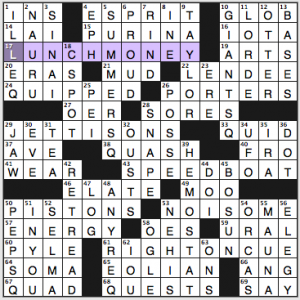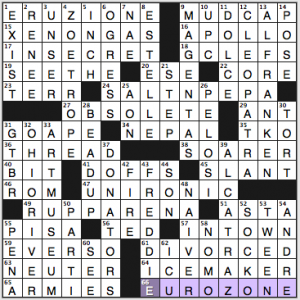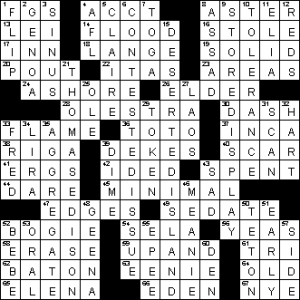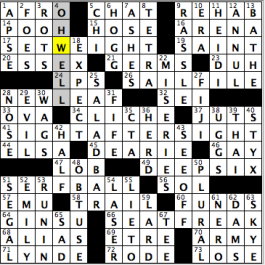NYT 6:15 (Amy)
Fireball 6:33 (Amy)
LAT 4:18 (Gareth)
CS 14:11 (Ade)
BEQ tk (Matt)
John Guzzetta’s New York Times crossword
Another “theme answers turn 90° in the grid” theme. Here, the revealer is RIGHT ON CUE, 61a. [Prompt … or a hint to entering five answers in this puzzle], and each themer turns toward the grid’s right at the letter Q. The rightward Q-words are all legit fill, and clued as such.
- 1d. [Not ready], ILL-EQUIPPED, with 24a. [Produced laugh lines?] cluing QUIPPED.
- 5d. [Crookneck, e.g.]. SUMMER SQUASH, with 38a. [Put down], QUASH. May I just say how disappointed I am that “crookneck” visually represents this answer but none of the other theme clues do? [Pattypan or zucchini] would work.
- 10d. [Army terror?], GIANT SQUID/33a. [Pounds], QUID. Cute 10d clue.
- 50d. [School spirit raiser], PEP SQUAD/67a. [Leg muscle, informally], QUAD.
- 48d. [D.J.’s invitation], ANY REQUESTS/68a. [Challenges for knights], QUESTS. Had JOUSTS, which slowed me down a lot.
I like this theme, and while RIGHT ON CUE sounded so foreign to my mind’s ear while I was putting the answer together, eventually it dawned on me, right on cue.
 Lots of colorful long fill occupying spots that look like theme answers but aren’t—LUNCH MONEY, JETTISONS, and SPEEDBOAT are great.
Lots of colorful long fill occupying spots that look like theme answers but aren’t—LUNCH MONEY, JETTISONS, and SPEEDBOAT are great.
Let’s talk about 22a. [Borrower], LENDEE. That’s not a word! Onelook.com indexes dozens of dictionaries, and none of them have documented this as a word anyone uses. Now, LENDEE is not the only woeful fill here. There’s also LAI, OES ([Latin diphthongs]!!), INS plus IN YOU and IN E (and ONS), and EPH. OES! OES no.
This is a puzzle with a 4+ star theme, some 4+ star fill, and some 1-star fill. Let’s average it out to 3.75 stars. If your theme can’t come together without such compromises in the fill, maybe it’s a sign to back off a little, push less on the theme.
Peter Gordon’s Fireball crossword, “Themeless 86”
Never heard of 1-Across. [Athlete who lit the cauldron at the 2002 Winter Olympics], ERUZIONE? Okay, so 2002 must’ve been the Torino Olympics, but who is this Italian athlete? Googling … Huh, turns out he’s American, one of the 1980 Miracle on Ice hockey players, and this was the SLC Games. ERUZIONE is also the Italian word for “eruption,” and it is not quite an anagram of EURO ZONE, which appears in the opposite corner of the grid.
Also never heard of the other answer in the top row, MUDCAP. 9a. [Explosive charge used to blast the surface of a rock]? Sure, if you say so.
Favorite fill: UNIRONIC, ZOETROPE, BEAD UP, CLEOPATRA, AL FRANKEN, ALCATRAZ. Worst: SOARER, NAIVER, ASTA, GT. BR., DONATORS (ahem, they’re donors), plural MAGENTAS. In a 70-worder from a skilled gridder, I wasn’t expecting to see more than a tiny bit of clunky fill.
I solved this puzzle last night and am blogging it in the morning. Zero recollection of the clues. Feel free to point out your own likes and dislikes. 3.5 stars from me.
Jerry Edelstein’s LA Times crossword – Gareth’s review
One aspect of this theme puzzles me: the vertical themers. Is FLIPping a predominantly vertical action? This grid can be turned on its side and function identically; it’s a deliberate decision. Anyway, you FLIP SIDE to make SEDI (is that one of the lesser-known pharaohs?) and find it buried between two theme answers, as in THOMAS(EDIS)ON, CONTEST(EDIS)SUE, DESERT(EDIS)LAND ([Shipwreck movie staple] also matches DESERTISLAND), and STOR(EDIS)PLAY.
The theme is quite busy today, so the rest of the grid is mostly about containment. That’s fine, but it does put more pressure on the theme to deliver the goods…
Stuff:
 I started at 1A, saw [NFL threes], FGS and expected 1D to be thematic. Sure enough. Normally you wouldn’t resort to FGS in a small area, but when there’s a theme answer…
I started at 1A, saw [NFL threes], FGS and expected 1D to be thematic. Sure enough. Normally you wouldn’t resort to FGS in a small area, but when there’s a theme answer…- [’70s “Laugh-In” regular Ann], ELDER. Offbeat clueing choice for that. It confounds the, “if you haven’t heard of the person, they will have an oddly spelt name” crossword-solving rule of thumb.
- [“Rosanna” band], TOTO. Also responsible for possibly the worst song of the 80’s, Africa.
- [Bacall’s love, informally], BOGIE. Continuing with the 80’s soft rock theme, I will not be linking to Bertie Higgins.
- [Parrier’s tool], EPEE. With a “P”, not a farrier with an “F”. You could use an epee as a hoof pick, but it’d make things a tiny bit trickier than usual…
3.5 Stars
Gareth
Doug Peterson’s CrosSynergy/Washington Post crossword, “North to South”—Ade’s write-up
Sorry, all. Hope all is well, and just want to quickly review today’s special from Mr. Doug Peterson, where all of the N’s in common phrases are replaced by S’s, with the entries being puns of the clues.
- SET WEIGHT (17A: [Prop in a play about bodybuilders?]) – From “net weight.”
- SAIL FILE (26A: [Dossier on jobs and spinnakers?]) – From “nail file.”
- SIGHT AFTER SIGHT (41A: [Double vision?]) – From “night after night.”
- SERF BALL (51A: [Dance for drudges?]) – From “nerf ball.”
- SEAT FREAK (66A: [One obsessed with being on the aisle, say?]) – From “neat freak.”
Pretty good concept, and the fact that there were five theme answers gives this puzzle some crunch. Have been hitting up the SALAD BAR many more times lately while having lunches and dinners in an effort to lose some weight again (25D: [Self-service steak house station]). It’s been paying off, too…as well as running around in 95-degree Texas heat! No pun intended, but I was absolutely lost at sea with SEI, and even after filling that it, was left a little uneasy (32A: [Fast-swimming whale]). Frozen is now the gift that keeps on giving to crosswords, and with that, ELSA and Anna are now scorched in my mind (44A: [Animated “Let it Go” singer]). Maybe I’ll watch the movie some time in the near future, as I totally can’t remember the last Disney movie I’ve seen.
“Sports will make you smarter” moment of the day: HERD (36D: [Group of wildebeests]) – The Marshall Thundering HERD, or “The Herd” to many of its fans, is a collegiate athletics program currently in Conference USA. The Herd have produced a few professional players throughout sports, with a couple of the most famous athletes they’re churned out being future Hall-of-Fame wide receiver Randy Moss and former New York Jets quarterback Chad Pennington.
See you all on the weekend!!
Take care!
Ade/AOK




If one can abide Wiktionary, their definition of LENDEE is, “The person to whom something is lent”.
Wiktionary can be handy, but it’s crowd-sourced rather than assembled by professional lexicographers. If the professional lexicographers have all failed to attest to the usage of this word, why believe that the Wiki folks are somehow savvier about the English language than lexicographers?
Agreed. I have edited wiki pages myself, with no one vetting me to my knowledge. There needs to be some agreed base of legitimacy. Good call.
Wikipedia comes in handy for info that isn’t provided elsewhere in an easy and accessible manner (bios of people who are too current to have encyclopedia articles about them, compilations that let you compare laws by state or country, recording artists’ discography and chart performance, etc.), but dictionaries are different. Dictionaries are continually being updated as the language changes, and while they may not explain newfangled slang until it has already stood the test of time, for ordinary words they beat the pants off a crowd-sourced Wiktionary. I use Wiktionary much more for foreign words.
I am prompted by this discussion to ask an unrelated “ee” usage that was much in the news recently. Why “escapee” instead of “escaper?” EE’s seem passive to me, typically not a jail breaker descriptor. Thanks.
Michael Quinine addresses -ee in general and escapee in particular here: http://www.affixes.org/e/-ee.html
Apologies for going at great length, but it occurs to me that “lendee” fails both these tests. A lendee is not lent by a lender; that would be the money. Nor is a lendee is doing the lending all by himself; that would be a bank-robber.
[edit: this comment was supposed to go below the next one]
It’s a tricky question. One explanation that I’ve seen goes like this. The -ee suffix applies when you are the object of a transitive verb. That is, a job interviewee is interviewed by an interviewer, and with luck becomes an employee employed by an employer. These are transitive verbs: an employer employs someone, who becomes the employee, and so on.
But “escape” is an intransitive verb. The person escaping is not escaping from an escaper, but is doing the escaping all by himself. And in this case “escapee” describes the object of the person’s own action, not anyone else’s. Similarly, an “attendee” is doing the attending by himself, not being attended by an attender.
To put it another way, a verbee is either the object of verbing by someone else, or the perpetrator of verbing when there is no such person.
This is sometimes claimed to be a rare example in English of an implicit use of the ergative case for verbs. But I’m getting out of my depth now…
FWIW, wiktionary is not considered a justification for a word. In this case, “lendee” is found in the M-W unabridged, Second Edition. Occasionally a word will be found only there and be accepted due to that listing. I remember Manny Nosowsky once saying he argued that the M-W2 listing of some word was good enough, and ultimately prevailed.
NYT: I liked the theme, did not love some of the fill… BOSUN crossing NOISOME did not exactly pop right up.
I liked HEMOSTATS and JETTISON.
I had deAthSQUiD for a while for the army menace. And I needed my husband to help me get that clue after the fact… (but it was cute when I got it ).
I agree that LENDEE is very weak. I also wasn’t very happy with IN E, clued as “Having four sharps”, as the clue defines “In E major“, but I suppose that unqualified “In E” is conventionally taken to mean that, so it does pass muster.
I didn’t know NAURU at all. I expect the crossing with LAI will prove problematic for some.
Still have no idea what “Army” means in the context of giant squid. Can anyone enlighten me?
“Having lots of arms/tentacles.”
Speaking of “having four sharps”, any word on how Bruce is doing?
Ohh. Thanks.
Mike ERUZIONE was a gimme for me, especially once a crossing letter or two was in there. He is often interviewed regarding the Lake Placid Olympics, as he was captain of the squad. I remember the “Miracle on Ice” vividly, even though I was only 11 years old or so. It was that big of an upset over the Soviets. ESPN has an interesting documentary on this from the point-of-view of the Soviets. Very interesting. Trivia: the win over the USSR was actually the semifinal game; the USA won the gold after defeating Finland. The Soviet Union, evidently highly upset, won the bronze medal game over Sweden NINE-two!
One of the big issues in legal writing these days concerns the elimination of (archaic) -OR and -EE endings. There are a few in good standing such as LESSOR and LESSEE, but others, particularly INDEMNITOR and INDEMNITEE, are in disrepute.
LENDOR and LENDEE are intuitive, but would be summarily rejected in any legal writing. I question whether something whose meaning is obvious is not a word, but I agree that LENDEE is an unacceptable abomination. I would be curious to see if LENDEE has ever been used in place of BORROWER. And that gets back to the initial admonition that good legal writing has moved in the direction of having clearly differentiated words such as LENDER and BORROWER and away from potentially ambiguous terms (depending on context) such as INDEMNITOR and INDEMNITEE.
I thought it was an excellent puzzle today. I am now expanding to include Thursday puzzles. Recently, I have only made time to do Fri. and Sat.
Steve
As Polonius said, neither a lendee nor a lendor be…
Really loved the NYT theme – excellent use of Q’s!